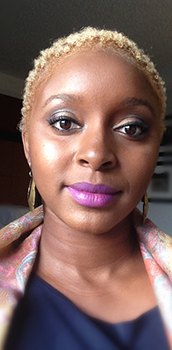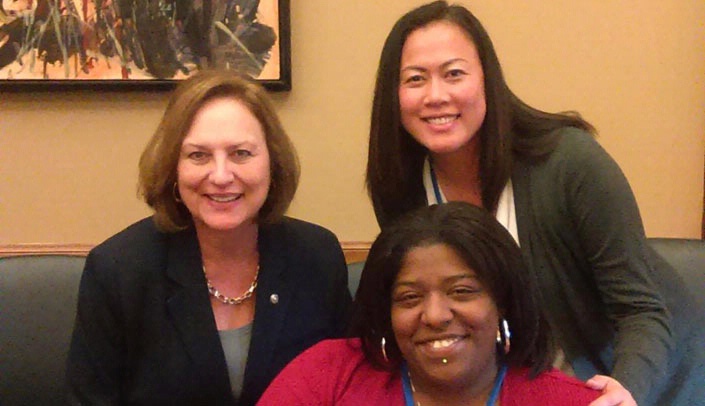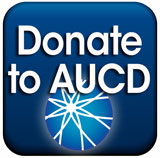DREAM Fund Recipients
Paulina Larenas, Oregon Child Develppment and Rehabilitation Center LEND
Attended the AUCD Conference, 2016

Originally from Chile, Paulina now works for a non-profit organization in Oregon, called FACT Oregon (Family and Community Together), that provides parent training information and outreach to families, communities and individuals experiencing disability focusing in special education, but also accessing the services they need including health.
She has worked for two years with Oregon’s LEND at the Child Development and Rehabilitation Center clinic. Some of her projects include the creation of an early autism detection program for Latino families, and more recently a member of their Diversity Task Force, which is a group of providers, administrators, and community members that are helping to identify needs within the department surrounding diversity and inclusion, coming up with an action plan in how to serve these needs, and then carrying it out to make changes that will better serve children and families as well as the employees.
Paulina is a parent of a child with Autism and Cowden syndrome a rare genetic disorder that is linked to several different diagnoses and health issues. She has advocated and put a lot of work into getting her medical and school staff, as well as her service providers to know her, listen to concerns, and realize that she is the expert on her daughter. She is continually working to change the stigma people have about individuals experiencing disability, focusing on their strengths and capacities, and how they can be supported to be successful and have a whole life.
As a person from a difficult culture, Paulina feels the necessity to advocate for her community, for her daughter, for minorities, and for all people experiencing disabilities so they have a voice. She always tries to bring her experience as a parent of a child with disabilities, as a professional working with families, and as a minority in navigating the systems and overcoming the barriers to her work and the field.
Karabo Monyneaux-Molloy, US Virgin Islands
Attended the United State of Women Summit, 2016
 The Association of University Centers on Disabilities (AUCD) is proud to bring Karabo Molyneaux-Molloy to Washington, DC, to participate in the United State of Women Summit and advocate with her member of Congress on behalf of people with disabilities in the US Virgin Islands and throughout the United States and territories.
The Association of University Centers on Disabilities (AUCD) is proud to bring Karabo Molyneaux-Molloy to Washington, DC, to participate in the United State of Women Summit and advocate with her member of Congress on behalf of people with disabilities in the US Virgin Islands and throughout the United States and territories.
Mrs. Molloy was born in Botswana, Africa. She grew up in St. Croix and attended the St. Croix Educational Complex. With the assistance of the US Virgin Islands Bureau of Vocational Rehabilitation and academic scholarships, Mrs. Molloy graduated from Otterbein University with a Bachelor's degree in Public Accounting. After graduating from Capital University Law School, she returned to St. Croix in 2014. She currently serves as a law clerk to the Honorable Judge Harold Willocks.
While in DC, Mrs. Molloy has visited the offices of United States Congresswoman Stacey Plaskett, Eve Hill (Senior Counselor to the Assistant Attorney General for Civil Rights at the US Department of Justice), Aaron Bishop, MSSW (Commissioner, Administration on Disabilities at the Administration for Community Living). During these visits, Mrs. Molloy spoke about the situation for people with disabilities in the US Virgin Islands and her hopes to expand opportunities for this population.
She also attended the #StateofWomen Summit and participating in conversations around economic empowerment, health and wellness, educational opportunity, violence against women, entrepreneurship and innovation, and leadership and civic engagement. Karabo heard from speakers including First Lady Michelle Obama, Oprah Winfrey, Warren Buffett, Anna Maria Chávez, Gloria Steinem, Shonda Rhimes, and AUCD's Liz Weintraub.
JaToya "Toya" McIntosh, Munroe-Meyer Institute (Nebraska)
Attended the AUCD Conference and visited Capitol Hill, 2015

The Munroe-Meyer Institute's JaToya "Toya" McIntosh recently received a DREAM Fund Scholarship through the Association of University Centers on Disabilities (AUCD), MMI's network representative association in Washington D.C.
McIntosh, part of MMI's AmeriCorps program and a member of the University Centers for Disabilities team, was the inaugural recipient of the scholarship, established by AUCD in an effort to mobilize and lift up the voices that matter in the disability movement. The fund brings emerging leaders to Washington, D.C., where they can be a part of important events and bring their first-person perspective to national conversations about the lives of people with disabilities. It allowed her to attend AUCD's annual conference in D.C. last month.
At the conference, McIntosh attended several small-group sessions, including one focused on communication and self-advocacy skills for people with disabilities. Many nationally recognized disability advocates were in attendance, as well.
"This meeting helps you learn how to be a good self-advocate: have a voice, be yourself and learn how to do things for yourself, network," McIntosh said. "I got to meet other national leaders and learn from them."
McIntosh also met with Nebraska senators Deb Fischer and Ben Sasse, as well as officials from Rep. Brad Ashford's office, to discuss transportation issues and barriers for people with disabilities.
She also met with officials from the U.S. Department of Transportation to share her personal challenges, which arise from a genetic disorder that mimics the symptoms of cerebral palsy. She has had problems with using metro buses, with the lack of curb accommodations for wheelchair use and other obstacles.
She was excited for the opportunity to meet with Nebraska leaders. "That's what we need to do," she said. "We need for people to tell their stories."
>>Read the full article from MMI.








